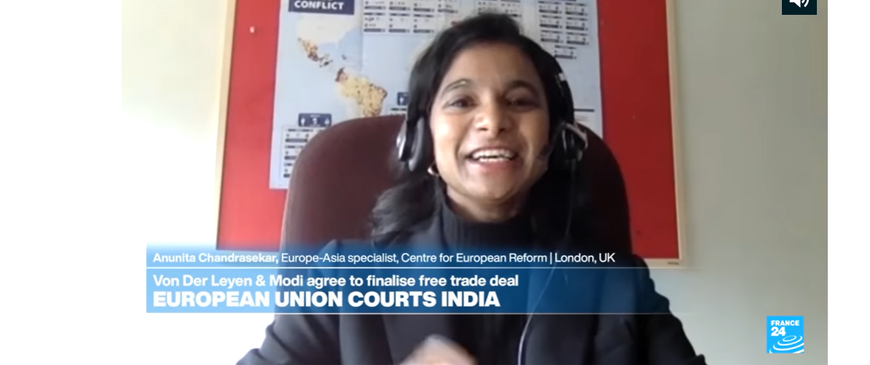Press
Eurozone rescue row doesn't shake German view
18 November 2010
Reuters
"Taken out of context there is obviously merit to the Franco-German proposal. But the timing could not have been more damaging," wrote Simon Tilford, chief economist of the Centre for European Reform.
Obama sets aside only two hours to meet with European leaders at NATO meeting in Portugal
18 November 2010
CNS News
"Obama will continue to think of engaging China as a top US priority, and seek to get along with Russia and other emerging powers," Tomas Valasek of the Centre for European Reform in London, wrote this month. "The issues that will compete for the president's attention over the next few years will be Iran, Afghanistan and the Middle East peace process. Neither the EU nor Eastern Europe is likely to move up his agenda."
Barack Obama, tell us that we're special
17 November 2010
The Guardian
This disconnect has a broader geopolitical context. Styling himself America's "Pacific president", Obama appears fixated on the rising stars of Asia, principally China and India, and on Russia's continuing leverage, argued Tomas Valasek in a paper for the Centre for European Reform. "The president believes the rise of emerging powers … puts new constraints on America's ability to set the global agenda. So he is courting China, Russia and other new powers to encourage them to take a greater stake in managing the global order," Valasek wrote.
Transport ministry looks to Asia
17 November 2010
The Prague Post
"When it comes down to imported goods, it's much easier to draw a link between very low prices and the implicit subsidy," said Simon Tilford, chief economist at the Centre for European Reform, who added that much of China's subsidies come in the form of its enormous currency reserves, which keep the yuan at artificial lows. But civil engineering projects abroad are trickier when it comes to proving state help, especially since the firms must largely rely on local labour and resources...
Uncertain destination of Atlantic journey
17 November 2010
Financial Times
Clara Marina O’Donnell, a defence expert at the Centre for European Reform, says European cuts are so serious that they make this week's summit look like "a surrealist play". She notes that Nato's new "strategic concept" will set out fresh ambitions for the alliance to deal with cyberwarfare, missile defence and terrorism, "yet in Europe, the very resources to deal with those threats are being cut back hugely". There are hopes that two new European Union directives setting out competition rules in defence procurement will reform the sector.
As Ireland flounders the EU moves towards a bailout
17 November 2010
Time
Simon Tilford, chief economist at the London-based Centre for European Reform, says that unless the EU intervenes, investors will believe that default is inevitable and demand correspondingly punitive interest rates. "Contagion to other member states will be all but inevitable," he says. "If, and when, it reaches Spain, the crisis risks spiraling out of control."
Climate change set to cause migrant surge
17 November 2010
CNN
First societies must become strong enough to cope with newcomers, according to Hugo Brady, a senior research fellow at the Centre for European Reform. "It's disingenuous to say business needs migrants and we're all getting older so it'll all be fine. It skips over the fact that it doesn't follow that we can solve our demographic problems with lots of immigration. And it ignores the fact that our societies need to be set up for that. I'd be sceptical that societies could absorb immigration on the scale suggested by our demographics.
Eurozone plans possible Irish bailout
17 November 2010
Radio Free Europe
Simon Tilford, the chief economist for the London-based Centre for European Reform, says a request from Ireland for other eurozone members to stabilise the Irish banking sector essentially amounts to support for the Irish state budget: "Investors have started to shun Irish government debt because they are worried about the [possible] liabilities in the country's banking sector - because the Irish government has essentially underwritten the debts of the private banks," Tilford explains.
The price of German leadership
17 November 2010
Financial Times
The euro, the European Union’s boldest and most ambitious project, is under threat. Divisions among Europe’s leaders, and their inability to stabilise the euro, have damaged the EU’s reputation on other continents. The good news is that the EU now has an emerging leader.
Eurozone seeks way out of Irish debt crisis
16 November 2010
Business Standard
"Unless the EU changes track and agrees to make the EFSF (rescue fund) permanent and the ECB steps up its purchases of the hard-hit countries' government bonds, investors will believe that default is inevitable and demand correspondingly punitive interest rates," said Simon Tilford, chief economist at the London-based Centre for European Reform. "Contagion to other member-states will be all but inevitable. If, and when, it reaches Spain, the crisis risks spiralling out of control," he said.
Lisbon falls flat
15 November 2010
Newsweek
"The Europeans need to realise that if they want to be taken seriously, then they have to be relevant," says Charles Grant of the Centre for European Reform, a London think tank.
Herman Van Rompuy: The man who wants to control your finances
15 November 2010
The Telegraph
Since coming to power, Cameron has been mending fences with Merkel and Sarkozy, after his provocative decision in opposition to stop sitting with their parties in the European Parliament. Adopting Persson’s advice to "play politics" with economic governance, an issue that affects the eurozone more than Britain, would "antagonise" our partners all over again, says Katinka Barysch, deputy director of the Centre for European Reform think-tank. It would also, she says, "damage Britain's own interests.
Bail-out fund stands by for first big test
12 November 2010
Financial Times
But Simon Tilford, chief economist at the London-based Centre for European Reform, said the shifting sentiment signaled by Ms Merkel's stance has overwhelmed the temporary calm. "The fact that [the EFSF] is there means they're in a better position than they were in late April or early May [at the height of concerns over Greece], but it doesn't change anything fundamental," Mr Tilford said.
France takes the lead of G-20
11 November 2010
Voice of America
That's partly why experts like Simon Tilford, chief economist at the Centre for European Reform in London, are skeptical about Mr Sarkozy's goals. "I think he's hoping that taking on the G20, G8 will bolster his international credentials ... I think that could prove a bit of a forlorn hope. He's taking over at a time of considerable international tension. It's been a long time since we've seen such big differences on positons of key issues among the world's leading economies."...
Fewer dragons, more snakes
11 November 2010
The Economist
In a paper published earlier this year [Germany opens Pandora's box] by the Centre for European Reform, a think-tank in London, George Robertson (a former NATO secretary-general), Franklin Miller and Kori Schake (defence policy experts who served in the Bush administration) argued that Germany was opening a Pandora's box by trying to provoke a debate on matters that had long been considered settled.
Why Germany is not a model for Europe
10 November 2010
Der Tagesspiel
Germany's economy has been winning numerous plaudits of late. It is not hard to see why. Previously much-vaunted economies "Ireland, Spain, the UK and the US, to name just four" lived way beyond their means for far too long.
Sarkozy signs the law: French retire at 62, not 60
10 November 2010
CBS News
Simon Tilford, chief economist at the Centre for European Reform in London, says Sarkozy "had no choice" other than to get the reform through because otherwise France's - and his - credibility would have suffered. "For anyone outside of France, this looks like a pretty modest move forward ... Other EU countries are moving much much more rapidly" on pension reform. France has the highest life expectancy in Europe but still one of the lowest retirement ages, prompting Tilford to predict that retirement issues will come up again before markets believe that France has its finances in order.
The peril that NATO can't ignore
10 November 2010
New York Times
"EU countries have 89 different weapons programs, while the US, whose budget is more than twice the size of the EU's defence budgets combined, has only 27," said Clara Marina O'Donnell, research fellow at the Centre for European Reform in London. "The main challenge for NATO is that Europe, given its lack of defence capabilities and funds, is not using this chance for greater cooperation, however urgently it is needed." This fragmentation of Europe's defence markets has proved expensive and inefficient.
What we talk about when we talk about Germany
05 November 2010
Financial Times
Charles Grant, director of the Centre for European Reform, has a nice summary of the debate up on his group's website, with some telling insights about the mood in France over the recent bluster from Berlin ... But Mr Grant also points out how destabilising even the narrowly-focused treaty changes envisioned by the 27 countries could be. Even if Ireland and Denmark are able to avoid referenda on the new language - which could be just a sentence or two added to the Lisbon treaty - other countries could cause problems, Mr Grant notes.
EU eyes tougher regulation for credit rating agencies
05 November 2010
Deutsche Welle
"The financial crisis did expose a number of problems with ratings agencies, including major conflicts of interest," Philip Whyte, a senior research fellow at the Centre for European Reform, told Deutsche Welle. "The people that were paying credit rating agencies were the same people whose securities were being rated. There's also been a certain amount of disquiet about the power that ratings agencies have," he added.
















